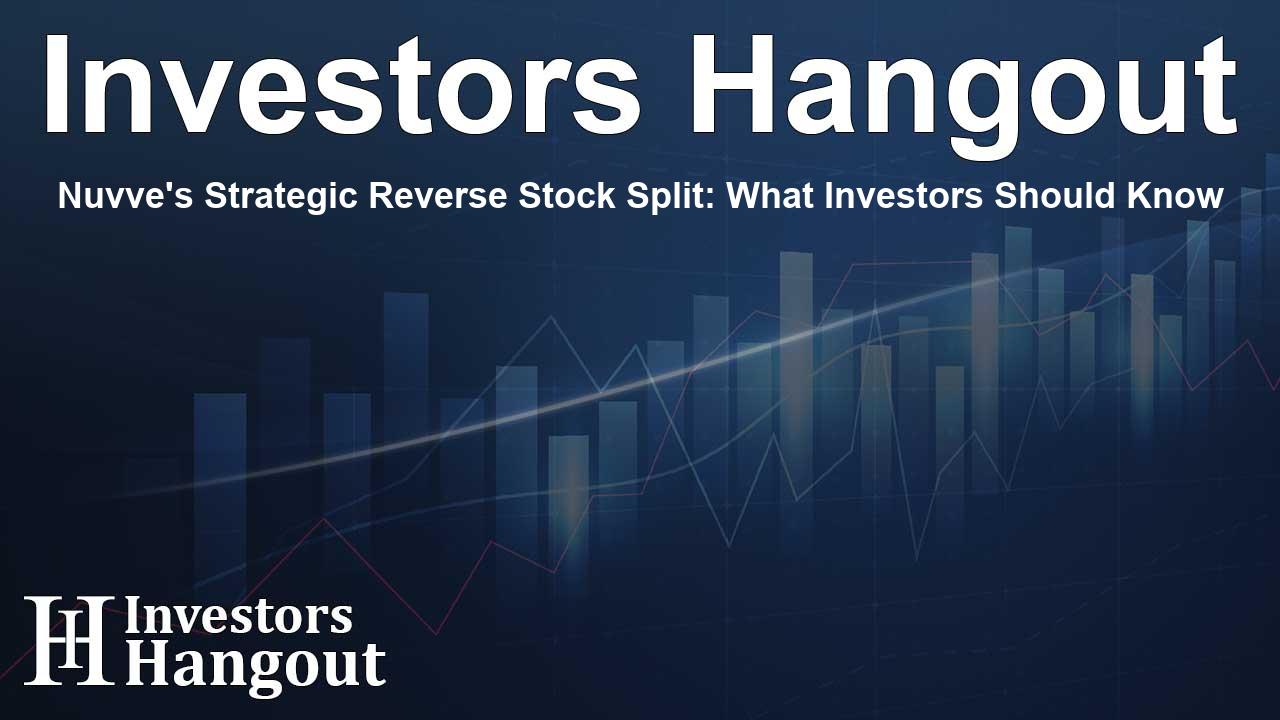Nuvve's Strategic Reverse Stock Split: What Investors Should Know

Nuvve's Strategic Move: Understanding the Reverse Stock Split
Nuvve Holding Corp. (NASDAQ:NVVE), which is based in San Diego and is well-known for its expertise in power distribution and specialty transformers, has recently undertaken a significant financial maneuver. The company has executed a reverse stock split at a ratio of 1-for-10, a decision that is designed to enhance its stock price and appeal to a broader base of investors.
Details of the Reverse Stock Split
The reverse stock split was officially processed at the close of business on a date following shareholder approval. In simple terms, this means that for every ten shares a shareholder held prior to the split, they will now have one share. This adjustment effectively lowers the total number of Nuvve's issued and outstanding common shares from approximately 6.5 million to about 0.7 million.
Impact on Share Value
This strategic action is often taken by companies striving to elevate their market price to meet listing requirements or to attract institutional investors. With the new structure in place, shareholders will continue to hold their ownership stakes, but the number of shares is consolidated, potentially leading to a higher per-share value.
Trading and Operational Changes
The trading of Nuvve's stock on a split-adjusted basis began as soon as the market opened following the adjustment. Notably, a new CUSIP number has been assigned to distinguish the post-split shares, ensuring that trading is done seamlessly in the wake of these changes.
Handling of Fractional Shares
A common concern during reverse stock splits is the handling of fractional shares that may arise. Nuvve has addressed this by ensuring that any fractional shares resulting from the split will be rounded to the nearest whole share. This guarantees that all shareholders receive full shares, providing them with clarity and certainty in their investments.
Adjustments to Securities
Additionally, the reverse stock split will influence other aspects of Nuvve’s financial instruments. It will proportionately adjust the terms of outstanding warrants, stock options, and restricted stock units. As a result, the number of shares into which these securities are convertible will change, along with their respective exercise prices, protecting the interests of stakeholders.
What This Means for Investors
For investors, understanding the implications of this reverse stock split is crucial. It is essential to grasp how this might affect their portfolio and the perceived value of Nuvve stock in the market. While the number of shares has decreased, the overall value remains equivalent post-split, creating a different landscape for potential buyers and existing shareholders alike.
Conclusion
Nuvve’s decision to conduct a reverse stock split reflects a broader strategy to stabilize its stock performance in a competitive market. As it navigates this transition, investor response and market dynamics will be indicators of the long-term impact of such moves on the company's trajectory.
Frequently Asked Questions
What is a reverse stock split?
A reverse stock split is a process where a company reduces the number of its outstanding shares, which in turn increases the share price proportionately.
Why did Nuvve conduct a reverse stock split?
Nuvve implemented the reverse stock split to enhance its stock price and meet certain market requirements, potentially attracting more investors.
How does a reverse stock split affect shareholders?
Shareholders will have fewer shares after the split but the overall value of their investment remains the same immediately following the split.
What happens to fractional shares in a reverse stock split?
Nuvve has stated that shareholders will receive a full share if their shares result in a fractional amount, ensuring no fractional shares are issued.
Will this affect Nuvve's trading on the Nasdaq?
Yes, Nuvve's stock will trade under a new CUSIP number post-split, which allows for transparency and clarity in trading activities following the adjustment.
About Investors Hangout
Investors Hangout is a leading online stock forum for financial discussion and learning, offering a wide range of free tools and resources. It draws in traders of all levels, who exchange market knowledge, investigate trading tactics, and keep an eye on industry developments in real time. Featuring financial articles, stock message boards, quotes, charts, company profiles, and live news updates. Through cooperative learning and a wealth of informational resources, it helps users from novices creating their first portfolios to experts honing their techniques. Join Investors Hangout today: https://investorshangout.com/
Disclaimer: The content of this article is solely for general informational purposes only; it does not represent legal, financial, or investment advice. Investors Hangout does not offer financial advice; the author is not a licensed financial advisor. Consult a qualified advisor before making any financial or investment decisions based on this article. The author's interpretation of publicly available data shapes the opinions presented here; as a result, they should not be taken as advice to purchase, sell, or hold any securities mentioned or any other investments. The author does not guarantee the accuracy, completeness, or timeliness of any material, providing it "as is." Information and market conditions may change; past performance is not indicative of future outcomes. If any of the material offered here is inaccurate, please contact us for corrections.